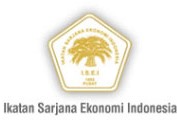FAKTOR-FAKTOR YANG MEMENGARUHI KETIMPANGAN PENDAPATAN DI JAWA TENGAH
(1) Magister Ekonomi dan Studi Pembangunan Fakultas Ekonomi Universitas Diponegoro
Abstract
Perhatian ekonom terhadap masalah ketimpangan sangatlah kurang. Kondisi ini juga dilakukan oleh lembaga dunia (Bank Dunia dan UNDP) terutama di bidang kemiskinan, serta pemerintah kita. Dampak kebijakan yang bias antara kemiskinan dan penanggulangan ketimpangan sosial dapat dilihat dari data. Di Indonesia, khususnya Jawa Tengah, selama periode 2002-2011, pertumbuhan ekonomi di Jawa Tengah meningkat disertai dengan pengurangan kemiskinan. Namun ketimpangannya meningkat. Tujuan dari penelitian ini adalah untuk menganalisis determinan pendapatan yang timpang di Jawa Tengah dari tahun 2002 sampai dengan 2011. Panel metode Data regerssion digunakan untuk mencapai tujuan penelitian ini. Ada 35 data cross section yang mewakili setiap kabupaten dan data seri selama 10 tahun Uji F dan uji Hausman menunjukkan bahwa model efek random terbatas adalah yang terbaik untuk analisis. Hasil penelitian menunjukkan bahwa hanya ada dua variabel yang signifikan yang menyebabkan ketimpangan (share of economic output received by employers wages). Sementara itu, dua variabel lain tidak signifikan (urbanization and dependency ratio).
The attention of economist to the problem of inequality is weak. This condition is followed by the world institution (World Bank and UNDP) which concerns in the areas of poverty, as well as our government. The impact of biased policy between poverty and inequality reduction can be seen from the data. In Indonesia, especially Central Java, during the period of 2002 to 2011, economic growth in Central Java increased accompanied by poverty reduction. However inequality increasedThe purpose of the study is to analyze the determinant of inequality income in Central Java from 2002 up to 2011. Panel data regerssion method is used to achieve the objectives of this study. There are 35 cross section data represent every regency and 10-years data series. F test and Hausman test indicate that restricted random effect models are best for analysis. The result shows that there are only two significant variables that determine inequality (share of economic output received by employers wages). Meanwhile, the other two variables are not significant (urbanization and dependency ratio).
Keywords
Full Text:
PDFRefbacks
- There are currently no refbacks.

This work is licensed under a Creative Commons Attribution 4.0 International License.






